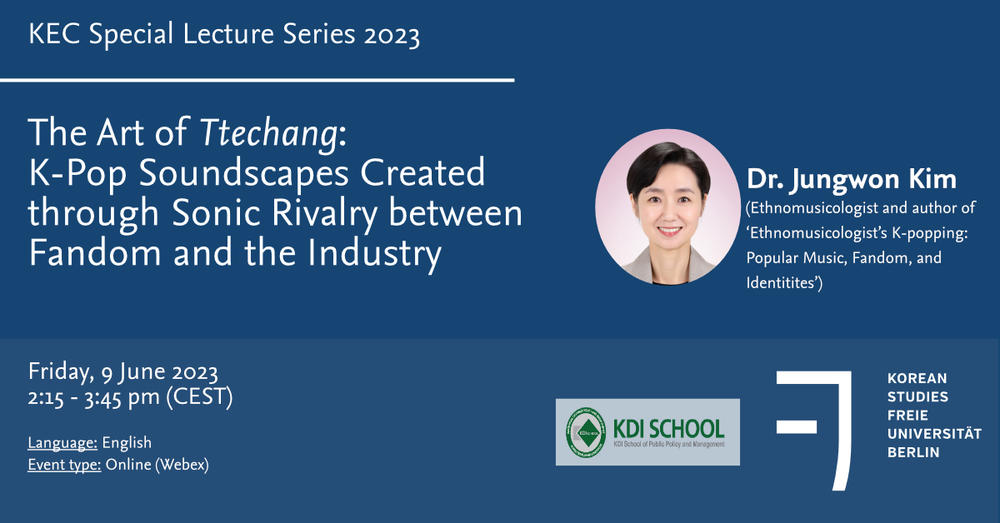KEC Special Lecture Series 2023 - The Art of Ttechang: K-Pop Soundscapes Created through Sonic Rivalry between Fandom and the Industry
The Korean Wave consistently piques the interest of media outlets. Especially in the German context, it is still perceived as a new trend. Sceptic voices remain most visible and question the reasons for its success. The most popular view is the soft-power perspective, painting the Korean cultural industry and its artists as embedded in foreign policy processes. Other views characterise Hallyu as a passing trend, a short-lived anomaly. Lastly, success is sometimes attributed to consumerism, stating that K-pop and other Korean cultural content are designed to appeal to everyone and especially the inexperienced youth. In short, Korean cultural content and its consumers are eyed with both wonder and distrust.
Beyond popular media discourse, academic discussion on how to understand the Korean Wave and its impact on a changing media landscape has emerged. However, until now, the German case was largely sidelined in discussions. Focusing on K-pop, the special lecture series “Sailing or drifting? The Korean Wave, self, and Fandoms” addresses this gap by providing an opportunity to discuss the impact of the Korean Wave on youth. Are individuals simply swept up by the wave or consciously riding it? Moving beyond arguments about the maturity of consumers and/or manipulation by media, the series highlights the artistic dimension of internationally popular Korean music and dances.
KEC Special Lecture Series - Sailing or Drifting? The Korean Wave, self and fandoms - Dr. Jungwon Kim
"The Art of Ttechang: K-Pop Soundscapes Created through Sonic Rivalry between Fandom and the Industry"
K-pop fans have shaped participatory culture in K-pop as an inclusive cultural phenomenon both within and outside of Korea. However, ignoring fandom and its socio-cultural, socio-political significance, the South Korean government has just taken advantage of K-pop to demonstrate the national soft power dominating the global pop market through Hallyu. Also, non-Korean, especially Western media outlets have disregarded K-pop and the Korean Wave as the subcultural scene forged by young consumers’ dissipation. Relying upon my long-standing autoethnographic research on K-pop fandom, as a K-pop aca-fan, this lecture highlights soundscapes of K-pop, which are constructed through fans’ spontaneous chanting and singing along to live performances, as well as through the K-pop industry’s design of the performances entailing the audience’s voices to create a sonic landscape of the venue. I trace this type of fans’ performing activity, also known as ttechang, to the 1990’s South Korean popular music scene where young audiences were yelling at and singing along with their favorite singers throughout the whole songs at live shows in order to not only express their love for music and musicians but also self-identify as sinsedae, meaning the new generation in Korean, against the old generation. Although the industry has appropriated ttechang to showcase a new package of successfully Koreanized editions of global pop genres through soundscapes characterized by both idol musicians’ spectaculars and fans’ sounds since the late 1990s, that is, the first-generation Korean idol era, audience members, using diverse timbres and tones of their voices in the performance of ttechang, have not only cultivated both their listenership and musicianship but also extended the range of musical sounds in the definition of K-pop. In particular, the global fans’ chanting and singing along to K-pop songs in Korean all over the world indicates how K-pop can be redefined through diversity and inclusion across cultural (linguistic, ethnic, and racial) differences regardless of disputes between Korean/non-Korean media and academia about authenticity and artistry around K-pop. The lecture then sheds light on how K-pop fandom, actively participating in ttechang during live shows, has contributed to the development of K-pop soundscapes while conforming or challenging to commercial and industrial schemes which have exploited the audience.
Lecturer
Dr. Jungwon Kim (Ethnomusicologist and author of ‘Ethnomusicologist’s K-popping: Popular Music, Fandom, and Identitites’)
Dr. Jungwon Kim is an ethnomusicologist pursuing Korean studies through looking into Korean music cultures and gender/sexuality issues in the contemporary South Korea. Since graduating from the University of California, Riverside in December 2017 with the dissertation investigating Korean female K-pop fandom, Dr. Kim has taught K-pop-related courses at colleges back in Korea. In addition to teaching, Jungwon, as an avid K-pop aca-fan, has conducted autoethnographic research on K-pop fandom, engaging in a variety of fan practices themselves both online and offline, as well as domestically and internationally. Dr. Kim’s first-ever book, the autoethnography of K-pop fandom has been out in November 2022 (https://product.kyobobook.co.kr/detail/S000200242067) as a result of their post-doctoral research supported by Pony Chung Foundation. Currently, Jungwon is writing papers on queer soundscapes in K-pop and feminist art pedagogy.
Registration: https://fu-berlin.webex.com/weblink/register/rc02d49b1c8c71a9b40c8b111b29f10bbZeit & Ort
09.06.2023 | 14:15 - 15:45
Online
Weitere Informationen
Gwendolyn Domning (g.domning@fu-berlin.de)

